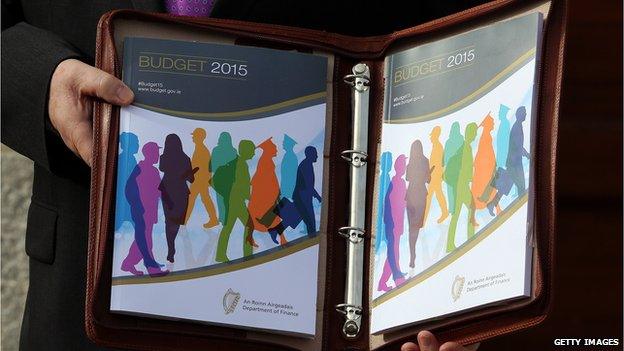Irish clampdown on tax avoidance will be followed by the UK
- Published
- comments

Today the Irish government announced something very significant. The closure of the notorious "Double Irish" tax loophole.
The reason it's important is not because it is changing Ireland's tax regime, which it is.
It is important because the double Irish is the method by which global companies reduce taxes on the businesses they run around the world.
And the Treasury is following developments closely and is poised to launch its own crackdown on "diverted profits", which is what the double Irish allows companies to do.
Google and Facebook have both been fingered for using the scheme - as have a number of pharmaceutical firms.
It enables businesses - via a complex system of royalty payments - to move revenues to locations which are described as "tax efficient" - such as low-tax Ireland and no-tax the Bahamas.
Campaigners argue that tax efficient should be more suitably described as tax avoiding.
The companies say that they are simply following the rules.
It wasn't Eric Schmidt, the chairman of Google, who decided that Ireland would allow a system to develop where corporations were effectively "stateless" for tax purposes, and could therefore move payments to tax havens like the Bahamas whilst still creating huge revenues in Europe via a company based in Dublin.
'Lowest taxes'
The use of the double Irish has had the effect of reducing the available taxes paid to countries where Google and Facebook operate, including the UK.
George Osborne raised the issue in his Conservative Party conference speech last month.
"While we offer some of the lowest business taxes in the world, we expect those taxes to be paid - not avoided," he said.
"Some technology companies go to extraordinary lengths to pay little or no tax here. If you abuse our tax system, you abuse the trust of the British people.
"And my message to those companies is clear - we will put a stop to it."
I am told that Treasury officials are now busy constructing new rules that will stop the diverting of profits made in the UK via intellectual property payments to company subsidiaries.
One source told me that profits made in Britain would be taxed in Britain.
This could make a significant difference to companies like Google and Facebook, which generate large amounts of revenue in the UK but do not pay significant amounts of tax.
The chancellor wants to make the move part of his "fairer markets" agenda.
He will need to convince campaigners that this is not just window dressing.
'Tax competition'
And his message on not avoiding taxes can become confused given that Mr Osborne also trumpets policies like the patent box. This makes it tax efficient to complete research and development in technology and pharmaceuticals in Britain.
Interestingly, whilst abolishing the "double Irish", the finance minister, Michael Noonan, did announce the creation of Ireland's equivalent of the patent box - the knowledge development box.
Tax competition will always exist. Governments want to encourage investment in certain sectors in their own countries and jealously guard their right to do so.
The most egregious might be limited. But don't imagine that companies searching the globe for the best, most tax efficient, place to do business is going to end any time soon.
Whatever the politicians say.